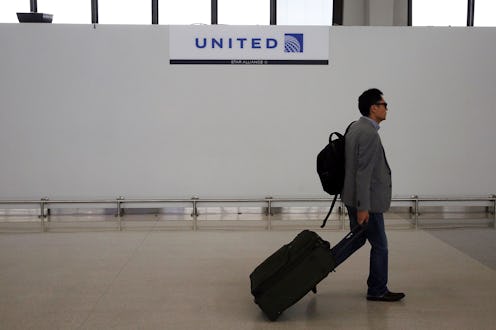News
You Should Know Your Rights While Flying

Social media was up in arms on Monday in response to a video of a man being physically dragged off a United Airlines flight when he allegedly refused to give up the seat that he had paid for. Though the airline had offered vouchers, no one volunteered to deplane, resulting in a situation of "involuntary bumping." Should this ever happen to you, there are some things you should know about your rights when flying.
There are two things to consider in these cases. One is the company's own "contract of carriage" that you agree to when buying the ticket. The contract, in most cases, is primarily meant to benefit the airline. For instance, United's contract mentions overbooking just once, when it tells you they can do it. "All of UA’s flights are subject to overbooking which could result in UA’s inability to provide previously confirmed reserved space for a given flight or for the class of service reserved," it reads.
Much longer is its explanation of its "involuntary denied boarding" policies. That's what the airline would have used in this case. You actually don't have the right to stay on the plane. Normally the flight crew would know before boarding occurs that there's not space, however, and nowhere is violence condoned against a passenger (the offending officer is already on leave). Sill, the contract of carriage ultimately says that the airline can take you off the plane. "UA shall have the right to refuse to transport or shall have the right to remove from the aircraft at any point, any Passenger" who does things like fail to comply with the contract of carriage, weather, safety, etc.
The only "rights" you really have in this situation is the right to compensation. And that comes from a government rule — not the contract of carriage. The Department of Transit lays out what you should get in a situation like this, where you're removed from a plane involuntarily. The flight must have originated in the United States for these regulations to apply, and if the airline gets you to your destination via a different route within an hour of your scheduled time, you don't get anything.
But if you're between one and two hours late (domestic flights, international between one and four) you are eligible to get 200 percent of what you paid for the one-way ticket (up to $675). If you're more than two hours late, or four for international, that doubles to 400 percent and a maximum payout of $1350. While that's not bad, it doesn't necessarily make up for missing an important meeting or event. The guy who was dragged off said he was a doctor and needed to get home to patients, for example.
Therefore, the best way to ensure that you aren't "involuntarily denied boarding" is to show up on time at the airport and not to pay the absolute lowest fair. It also doesn't hurt if you fly the same airline a lot. Most airlines decide who to bump based on check-in time and fare class. But if you're a frequent flyer that may be taken into consideration too.
So good luck flying, and be aware that you may be kicked off a plane. Just don't leave without the money the airline owes you if they do.